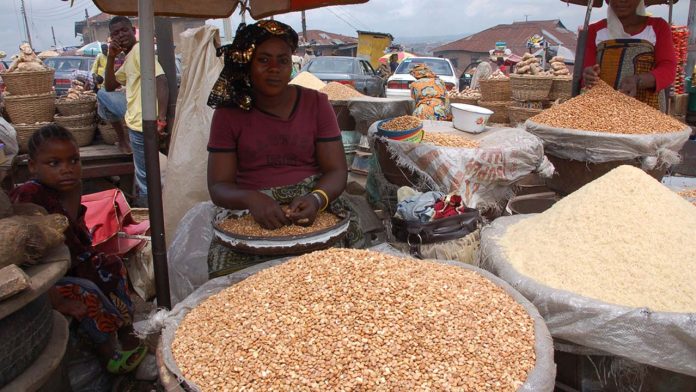Following the partial closure of land borders by the Federal Government, prices of food items and other commodities have risen by 52 per cent and above across the major markets in the country.
A visit to some markets in Lagos showed that traders and consumers were unhappy with the exercise, code-named “Ex-Swift Response,” the joint border security exercise initiated by the Federal Government as part of measures to beef up security at Nigeria’s land borders.
The distraught traders pleaded with President Muhammadu Buhari to reconsider opening the borders before the Yuletide, as they lamented the prices of foods and frozen items were getting out the reach of ordinary Nigerians.
For instance, before the joint border security exercise took place, a 50kg bag of rice was sold at between N9,500 and N11,000 across the nation’s borders. But a 50kg bag of rice now costs N15,000 to 17,000 at the borders. Even people living at the borders can no longer afford to buy rice.
Although the Federal Government has been encouraging Nigerians to consume local rice as a means of encouraging Nigerian rice farmers, the local rice is out of circulation, even the few brands in the markets are coarse and not well-processed, according to consumers.
For instance, the Lagos and Kebbi rice, known as Lake Rice, has turned to ‘essential commodity,’ with cost increasing by 22 per cent. Before now, a bag of Lake Rice was sold at N13,500 and a half-bag was N6,500. Presently, a bag costs N16,500, while half a bag goes for N8,000.
However, the price of a 50kg bag of foreign rice has increased by 52 per cent to N22,000 from previous N14,500. For vegetable oil and palm oil the increase is 22 per cent, as 5-litre keg of vegetable oil has moved from N1,800 to N2,200, while a five-litres keg of palm oil has also increased from N1,800 to N2,200 in the market.
Frozen poultry is the most affected in Lagos, as a kilogramme of frozen chicken, which sold for N1,200, now costs N1,600, while a kilogramme of frozen turkey now sells at N1,700. Also, a carton of frozen turkey costs N15,000; one carton of frozen ‘orobo’ chicken, N14,000, while a carton of Nigerian chicken costs N11,500.
Presently, at Mile 12 Market, a basket of tomatoes now costs between N7,000 and N8,000 as against the previous value of N4,000 to N5,000, and the price of pepper has also gone up.
Findings in states where Nigeria shares borders with other countries show that the prices of rice, poultry products, vegetable oil, sugar, beans and even fairly used cloths have risen tremendously.
A trader at Daleko Market, Alhaja Kabirat Adedemiloye, said the increase in price of food items has also affected sales, as demand, especially for rice, has really dropped.
She said Daleko was known as a major market for rice, vegetable oil, palm oil and other edible items, but the market has witnessed low patronage in the last one month.
The national president of the National Council of Managing Director Licensed Customs Agents (NCMDLCA), Lucky Amiwero, said the problem was that governments don’t close borders that way because Nigeria was not in a war, it is a normal security situation.
“We signed an ECOWAS protocol for free movement of people. Has Nigeria complied with the procedures of ECOWAS protocol? You don’t just close border like that because the borders are actually entry points. It is just like you are closing your airport or closing your seaports.
“Nigeria has three entry points, which are airport, seaport and border stations, and all these are legal stations in line with the provisions of the law, and we have ECOWAS protocol and the protocol is talking about free movement of persons and goods and you have signed this protocol. If you want to do any closure, it must be (by) country-to-country negotiations and the issue should be done according to information, which is contained in the World Trade Organization agreements.”
He bemoaned the way government handled the issue and said it was not done according to law.
He stated further that, by leaving people stranded, it was not good for the image of Nigeria because people would start looking at Nigeria as a bad country to invest in.
According to him, what the government has done was not in line with the ECOWAS protocol because, if they are going to close the borders, they should have given notice that were going to close the borders. He said, if it was based on security reasons, that reasons must take into consideration certain things that have to do with the protocol.
“There would a lot of implications, which mean a lot of people might not be able to move out their cargo and it would affect small trades within the sub-region. It would also affect small traders and the country too.
Sunonline


